GIDEON and GOD’S GRACIOUS DELIVERANCE
Seven times in the Book of Judges we come across this indictment: “the sons of Israel did evil in the sight of the Lord” (2:11; 3:7; 3:12; 4:1; 6:1; 10:6; 13:1).
What evil did they do?
They were turned aside by their lusts (covetousness) to serve idols.
A DESCRIPTION OF THE SIN CYCLE
Chapter 2 gave us a summary of the cycles of failures and deliverances to come: (2:11-23)
They do evil in the sight of the Lord- turning to sin and self-reliance (2:11)
They covet and give in to the culture’s idolatries/forgetting the Lord (2:12)
They serve counterfeit gods (2:13)
They fall into trouble, defeat and enslavement (2:14)
They experience distress (and sometimes cry out to the Lord) (2:15)
The Lord raises up judges (saviors) to deliver them (2:16)
They are delivered (2:18)
When the judge dies the nation returns to its former sins and becomes more corrupt in its behaviors (2:19).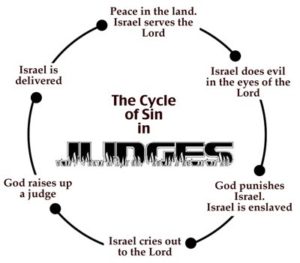
The Book of Judges not only demonstrates that we need a savior to save us from our individual sins, but we need a savior to keep us saved (save us from the sin cycle!) We need the gift of a holy life! Moral reform and religious revival do not deal with the root problem. We need a Savior who will save us to the uttermost! (See Hebrews 7:25) This is the kind of Savior we have in Jesus! (2 Peter 1:3).
In Judges 1 through 5 we read of the first three deliverances.
- The sons of Israel did evil in the sight of the Lord by serving the Baals and Ashteroth (3:7). They were delivered to the King of Mesopotamia (Cushan-rishathaim) for 8 years. When they cried to the Lord, the Lord raised up Othniel (3:9).
- The sons of Israel did evil in the sight of the Lord and were delivered to Eglon of Moab for 18 years. The Lord raised up Ehud to deliver them (3:12).
- The sons of Israel did evil in the sight of the Lord and the Lord sold them into the hand of Jabin, king of Canaan, and the commander of his army, Sisera, who oppressed them severely for 20 years. The Lord raised up Deborah and Barak as their deliverers (4:1).
In Chapter 6, we read of the fourth deliverance.
- The sons of Israel did evil in the sight of the Lord (6:1) and the Lord gave them into the hand of Midian for seven years. The Midianites brought them very low and devastated the land. The people cried out to the Lord (6:7) and the Lord raised up Gideon (6:12).
The Midianites terrorize the Israelites and devastate their crops.
“The power of Midian prevailed against Israel. Because of Midian, the sons of Israel made for themselves the dens which were in the mountains and the caves and the strongholds” (Judges 6:2).
The Midianites are bullies. They seize the livestock, exploit their grazing fields, sabotage their crops and humiliate the Israelites in whatever way they can.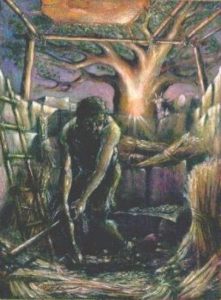
When the Israelites cried out to God for deliverance, the Lord sent a prophet to remind them that if they had properly feared Him there would be no need for them to fear the gods of the Amorites. But they had been disobedient.
GIDEON’S CALL
Gideon’s call to be Israel’s deliverer is quite humorous. Because of Gideon’s fear of the enemy and his desire not to be seen by them, he threshes wheat in a winepress. The threshing of wheat was often done on the top of a hill. There the wind would blow the lighter chaff away from the heavier kernel when it was tossed into the air. But Gideon was afraid he would be visible to the enemy on a hilltop. Instead he chose to thresh his wheat in a pit that was used for a wine press. Whereas he was less likely to be seen by the enemy in this unusual spot, he was less likely to be productive in threshing grain. How often fear clouds our thinking like this!
The God of all grace addresses this very insecure man as if he were a courageous hero!
The angel of the Lord appeared to him and said to him, “The Lord is with you, O valiant warrior” (Judges 6:12).
How does Gideon respond to this gracious appellation? He complains:
“O my lord, if the Lord is with us, why then has all this happened to us? And where are all His miracles which our fathers told us about, saying, ‘Did not the Lord bring us up from Egypt?’ But now the Lord has abandoned us and given us into the hand of Midian” (Judges 6:13).
We often moan, “If God is good, why do I suffer?” The fact that God’s people had been disobedient, turned to idols and forsaken Him did not seem to cross Gideon’s mind, although a prophet had just explained this to the people of Israel (verse 10).
The LORD does not reprimand Gideon, instead He commissions him! (v.14). Gideon, like Moses being called by God from the burning bush, makes excuses. How can he be useful to God? He is the youngest in his family and his family is the smallest in the tribe of Manasseh!
We see a pattern in God’s choice of human instruments throughout the Bible.
But God chose the foolish things of the world to shame the wise; God chose the weak things of the world to shame the strong. He chose the lowly things of this world and the despised things–and the things that are not–to nullify the things that are (1 Cor 1:27-28).
The LORD dodges Gideon’s excuses and promises him victory, saying
“Surely I will be with you, and you shall defeat Midian as one man” (Judges 6:16).
Here we have a prophetic picture of the instrumentality of a corporate vessel, the people of God acting as one. This is applicable to the church as Scripture calls it one new man, the body of Christ (Ephesians 2:15).
Gideon continues to waffle in unbelief. He asks for a sign. He asks the Lord to stay there until he prepares an offering to put upon a rock as an altar. The Lord supernaturally affirmed his offering by causing a fire to spring up and consume it. The angel of the Lord suddenly disappears, but the conversation continues. Gideon, after the fact, recognizes that he has been speaking with the angel of the Lord, saying “Alas, O Lord GOD! For now I have seen the angel of the Lord, face to face” (Judges 6:23).
Again the Lord graciously comforts and assures Gideon of success, giving him peace. Gideon builds an altar and names it, “The Lord is peace”.
But Gideon’s peace is short-lived. On the same night, the Lord commands him to tear down the altar to Baal and the Asherah pole beside it and then build an altar on top of this stronghold!
He is then to offer a bull on the new altar and burn it with the wood from the Asherah pole.
Fear causes Gideon to do it by night rather than by day (6:27).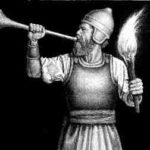
When the Israelites arose and saw what had been done, they were outraged. They want to kill Gideon. His father, Joash, tries to alleviate their vindictiveness by challenging them to let Baal defend himself, if he can, against this wrong. Gideon is named ‘Jerubbaal’, meaning “Let Baal contend against him.” (Ah, thanks, Dad).
A new scene begins in verse 33. The armies of the Midianites and Amalekites assemble in the valley of Jezreel.
A new beginning occurs for Gideon in verse 34. The Spirit of the Lord comes upon Gideon and he becomes the necessary leader bringing deliverance to the Israelites from the oppression of the Midianites. He is compelled by the Spirit to blow the trumpet. For all who heard it, it was a signal that a battle was imminent.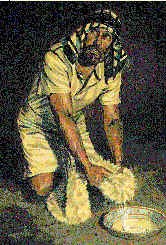
The Lord had given His promise to Gideon that He would provide deliverance from the Midianites, but Gideon was slow to believe it. He needed reassurance. He asked the Lord to give him an outward sign that the victory He had promised would indeed come. He put a fleece on the ground of the threshing floor and asked that if the ground would be dry, the fleece needed to be thoroughly wet. God answered that request. But rather than taking the answer as an assurance, Gideon asked for ANOTHER sign. He said that he needed further assurance that if on the next evening, the earth could be wet with dew, but the fleece be thoroughly dry, then he would believe.
And God GRACIOUSLY answered that request. (v.40)
Although there are some who believe that Gideon was unsure that God was going to give them the victory over the Midianites, it is more likely that Gideon’s real struggle was to believe that God was going to give the victory through him!
What about you? Do you find yourself making excuses when God asks you to do something? Do you put up a fight? Do you put up a lot of hoops for the Lord to jump through to give you assurance? Can you identify with Gideon’s slowness to believe that God could use him for His purposes?
When we look upon the accounts of those living at the time of the Judges we can recognize that there are many similarities with the spiritual climate of today. We all need a Savior. And in Christ, we have a deliverer who secures peace, not only for a season, but for all eternity!
READING FROM THE NEW TESTAMENT: Luke 22:54-23:12; 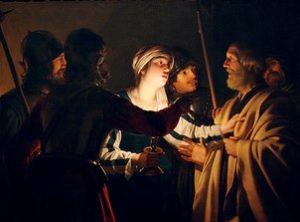
Within hours after claiming loyalty till death, Peter denies knowing Jesus.
Peter’s example reminds us that we know ourselves so little. And Jesus knows us so well.
Jesus has a plan to convert Peter. But first — the cross.
When Jesus is brought before the chief priests He gives a staggering response to their question.
Luke 22:70 (NIV) 70 They all asked, “Are you then the Son of God?” He replied, “You are right in saying I am.”
He uses the NAME that He as God revealed to Moses, (I AM) when He spoke from the burning bush in Exodus 3:14.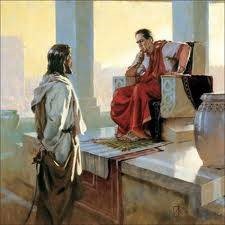
Exodus 3:14 (NIV) 14 God said to Moses, “I AM WHO I AM. This is what you are to say to the Israelites: ‘I AM has sent me to you.'”
Then Jesus is accused by the priests as he stands before Pilate. When Pilate asks Jesus if he is King of the Jews, Jesus responds giving Pilate an opportunity to confess it in faith- “It is as you say.”
When Pilate learns that Jesus is a Galilean, he sends Jesus to Herod Antipas. Antipas wants only for Jesus to perform miracles. Jesus refuses to answer Herod’s questions. The religious leaders turn to accusing Jesus while Herod and his soldiers mock and ridicule Him.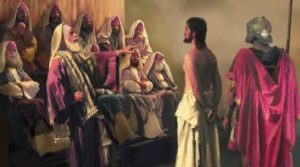
They put a royal robe on Him and send Him back to Pilate.
It is haunting to read that Pilate and Herod, who had been enemies, became friends on the day they agreed to do away with Jesus. Soon two opposing theological camps, the Sadducees and the Pharisees, would do the same.
READING FROM PSALMS: Psalm 95-96:13;
Psalm 95 is the first in a series of 5 psalms about praise and worship.
It contains calls to worship and a strong warning.
Verses 1 to 5 contain the first call to worship. Rejoice (verses 1 and 2) because you have good reason to (verses 3-5)!
Notice that it is corporate worship that is called for. “O come let US sing (v.1). Let us come before His presence (v.2). Worship is expressed here vocally! Worship is to be a joyful noise.
The second call to worship is in verses 6-7. It encourages us to adopt an appropriate posture- bowing and kneeling. Worship is expressed physically. These postures, whether of the heart or the body, suggest great reverence for God.
Let us not forget that He is our GOD, and we are the people of His pasture and the sheep of His hand (v.7).
Our hearts can be easily hardened (v. 8-11); especially if God glorifying praise is neglected. This is why we are given a warning. Hearts that are hardening are hearts that no longer are giving a joyful expression of praise. The greatness of God is no longer causing a sense of wonder in the heart.
Psalm 96
Sing! Create a new song for this moment and this fresh discovery of His grace! Put salvation on display so that not only your words, but your entire life brings glory to His Name!
There is no other God. The gods of the nations are mere idols (Ps. 96:5). We have our American idols, and our European idols, who will soon be forgotten. But the Lord made the heavens! Notice His attributes that are worthy of honor: His Majesty, His Glory, and His strength.
Psalm 96:9 (NIV) 9 Worship the LORD in the splendor of his holiness; tremble before him, all the earth.
The last thought is sobering: “For He is coming to judge the earth!” (v.13).
PROVERBS FOR TODAY
Proverbs 14:5-6 (NASB) 5 A trustworthy witness will not lie, but a false witness utters lies.
6 A scoffer seeks wisdom and finds none, but knowledge is easy to one who has understanding.
PRAY FOR THE NATIONS- Comoros (off Africa)
(from the Prayer Guide “OPERATION WORLD”)
Geography
Area: 1,862 sq. km
Three volcanic islands between Madagascar and Mozambique, all densely populated and resource poor.
Mayotte, which voted in 2009 to integrate fully with France, is claimed by Comoros.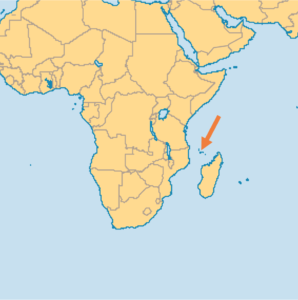
Population: 691,351 Annual Growth: 2.32%
Capital: Moroni
Urbanites: 28.2%
HDI Rank: 139 of 182 (UN Human Development Reports 2009)
Peoples
Peoples: 12 (67% unreached
Official language: Arabic, French, Comorian (a mix of Swahili and Arabic) Languages: 7
Religion
Largest Religion: Muslim
Challenge for Prayer
The vast majority of the population are Muslim. They were almost completely unevangelized before 1973. Islamic fundamentalism is on the rise. However, most are involved in occult practices through witchcraft, curses and spirit possession. Many young people – disillusioned with life in this society that offers so little hope – attempt to find solace in drugs, sex, or the opportunity to leave the islands. Pray that they might have opportunities to hear the gospel of life that offers hope to all.
There are severe restrictions on Christians. Evangelism is forbidden, and those who convert to Christianity can expect severe reprisals from the community and from their own family. Harassment and persecution have risen in frequency and intensity in recent years. Pray for courage for those choosing to follow Jesus, and wisdom for all who must walk out their faith in this hostile atmosphere.
PRAYER: Lord, You are worthy to be praised. We testify of Your greatness. We sing it. We shout it. We proclaim Your grace. Thank You for providing a deliverer who not only has delivered us, but He does deliver us, will deliver us, and keeps us delivered! We see the fickleness of the human heart as we reflect on these accounts. We see your boundless grace that rescues those who are feeble in faith. You see fearful Gideon as a mighty man of valor, and foot-in-mouth Peter as a pillar of the church who once converted will strengthen his brothers. Thank you for seeing us as byproducts of Your redemptive masterpiece in Christ. Renew our minds with fresh revelations of Your mercy, in Jesus’ Name. Amen.
David MacAdam, pastor
New Life Community Church, Concord, MA
So, naturally, we proclaim Christ! We warn everyone we meet, and we teach everyone we can, all that we know about him, so that, if possible, we may bring every man up to his full maturity in Christ. (Colossians 1:28, J.B. Phillips paraphrase)
New Life Community Church, Concord, MA 10742
www.newlife.org
